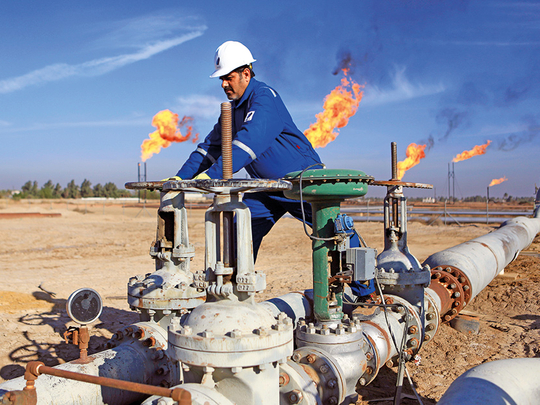
Dubai: Poltical tensions and the likelihood that major oil producers will extend an agreement to cut crude production is likely to keep oil prices elevated.
Oil prices gained more than 2 per cent to their highest level in a month on geopolitical uncertainty after the first air strikes of the new Trump administration.
Brent crude after rising more than $1 (Dh3.67) per barrel, closed 0.64 per cent higher at $55.24 per barrel. West Texas Intermediate closed 1.04 per cent higher at $52.24 per barrel.
“Market participants priced in a geopolitical risk premium post air strikes,” Giovanni Staunovo, an oil analyst with UBS told Gulf News over email. “To see the geopolitical risk premium staying sustained, the air strikes have to heighten tensions between Russia/Iran/Iraq and the US.”
Syria is a tiny oil producer, producing nearly 17,000 barrels per day versus global production of 96.5 million barrels per day.
Russia, which is participating in a deal to cut output, has warned retaliatory action, a move that many analysts feel could heighten geopolitical situation and impact many oil producing countries.
“We are expecting a moderate risk-off episode in markets in the next few days, until the level of commitment of the US in the conflict becomes clearer,” said Francisco Quintana Head of Strategy at Foresight Advisors.
Benefit
Oil prices, which were stuck at near $53 per barrel level, witnessed a fresh impetus in terms of air strikes for another move.
In the short-term, oil prices may continue to trend higher.
“We expect oil prices to benefit from our expected material decline in OECD oil inventories, as result of the Opec/non-Opec production curb deal, allowing Brent to exceed $60/bbl over the coming months,” Staunovo said.
In December, Opec and non-Opec producers agreed to cut oil output by 1.8 millions barrels of oil per day to cut swelling inventories. Prices had gained more than 50 per cent last year on the back of the agreement.
The technical committee, that met in Kuwait last month, said they will take a call in May if they seek to extend the deal to cut production. So far, countries like Iraq, Algeria, Angola and Qatar have backed an extension.
The compliance on the deal remains satisfactory. Until February, the compliance level stood at 94 per cent, an 8 per cent increase on month, which according to the technical committee of the Opec and non-Opec demonstrated the willingness of all participating countries to continue their cooperation.












